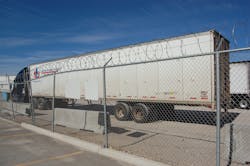A range of new cargo theft tactics are being deployed to help thieves take better “control” and thus mitigate the risks of the crimes they are trying to commit, according to experts with insurance provider Travelers.
In an interview with Fleet Owner, Sam Rizzitelli, national director for transportation at Travelers Inland Marine division, and Scott Cornell, national program manager for the Specialty Investigations Group or “SIG” with Travelers Investigative Services, explained that these new “tactics” fall into three categories: identity theft, fictitious pickups and misdirected loads/fraudulent carriers.
“They are trying to adjust their methods to develop better ways to get away with cargo,” Cornell noted. Rather than commit “straight theft,” where loads are physically stolen from parking lots or terminals – and risking getting spotted and/or potentially be involved in a high speed chase – he said cargo thieves are trying to be more “strategic” about thefts so they can better pinpoint and steal specific types of cargo.
“We’re seeing more of these ‘strategic’ kinds of thefts due to a combination of factors: more technology being used with greater access to information within the transportation industry and the involvement of more ‘intermediaries’ throughout the supply chain,” Rizzitelli added. “This allows cargo thieves to be in better control of ‘when’ and ‘where’ a theft is made, in many cases getting the desired cargoes ‘handed over’ to them rather than having to hunt it down and steal them.”
Indeed, data tracked by FreightWatch International indicates that the actual volume of loads stolen in the U.S. during the second quarter this year declined, the overall value of those loads increased.
For the second quarter, FreightWatch reported a total of 194 cargo thefts in the U.S., with 45 thefts in April, 66 in May and 83 in June, with the average loss value per incident reaching $164,594. Compared to the same period in 2012, those numbers represent a 27% increase in value despite a 12% decrease in volume, while compared the first quarter this year they represent a 4% increase in value and a 15% decrease in volume.
In terms of the new tactics being deployed by cargo thieves, Travelers’ Cornell explained that “identity theft” involves the use of a legitimate trucking carrier’s name to arrange to haul a specific load for a customer: and then vanishing with that load. “This is a more detailed type of ‘strategic’ theft, with the thieves involved throughout the contracting and load planning process,” he said.
The more “ad lib” variety of identity theft is now being dubbed the “fictitious pickup” where cargo thieves will briefly masquerade as a legitimate carrier in order to pinch a desired load. “They’ll call ahead to a shipper and say, ‘Hey we’re going to be a couple of hours early, so can we pickup XYZ load?’ They’ll sign and then depart with the load that the legitimate tractor-trailer then arriving at the appointed time will be looking for,” Cornell noted.
Finally, he said there’s the “misdirected load/fraudulent carrier” scam – one of the newer and more disturbing cargo theft tactics. In this case, the thieves may actually set up the “bones” of a real trucking operation – going so far as to contract for insurance – and then contract to haul loads. They’ll then fake a mechanical breakdown to create an alibi, allowing their load to be “stolen” while the shop is in a shop for repairs.
“Sometimes they’ll go so far as to file a police report and even an insurance claim,” Cornell pointed out.
To successfully combat such scams, Rizzitelli stressed that crafting the “right relationships” between carriers, shippers, and third party logistics providers is more critical than ever. “We can talk about the details all day long – there’s a book worth of them – but it really comes down to having the right relationships at the start,” he said.
“By that I mean, are carriers and shippers developing shared protocols around pickup procedures?” he explained. “Are there verifications in place to confirm the identity of specific drivers? Do shippers have procedures to verify the carriers that will be hauling highly targeted high value goods are who they say they are?”
Cornell added that regular networking with industry peers and especially with anti-cargo theft task forces and other law enforcement groups is also essential. “Are you sharing knowledge on a regular basis with them? Or are you just calling them up at 11 o’clock at night when you’ve had a load stolen?” he said. “That regular communication will also help build awareness of ongoing changes in cargo theft tactics as well.”
About the Author
Sean Kilcarr
Editor in Chief
Sean Kilcarr is a former longtime FleetOwner senior editor who wrote for the publication from 2000 to 2018. He served as editor-in-chief from 2017 to 2018.
